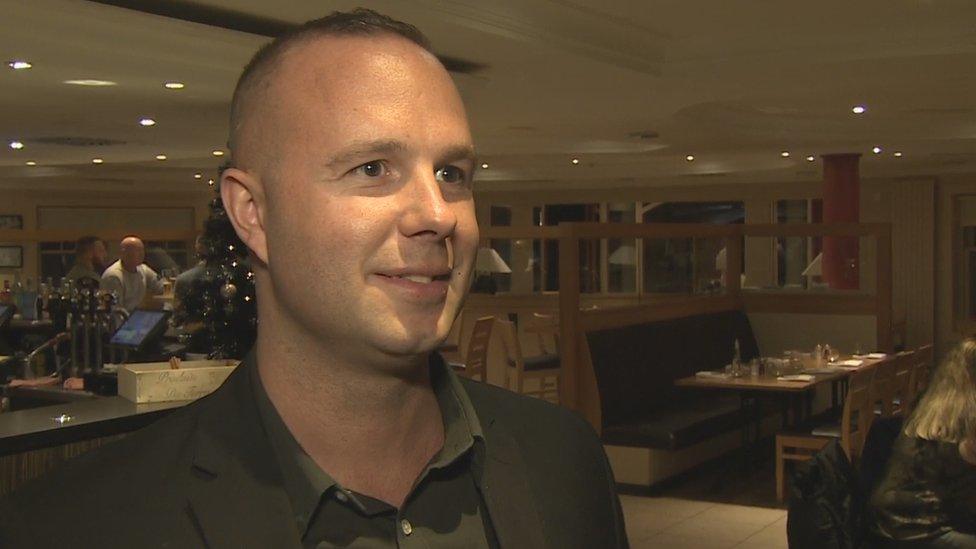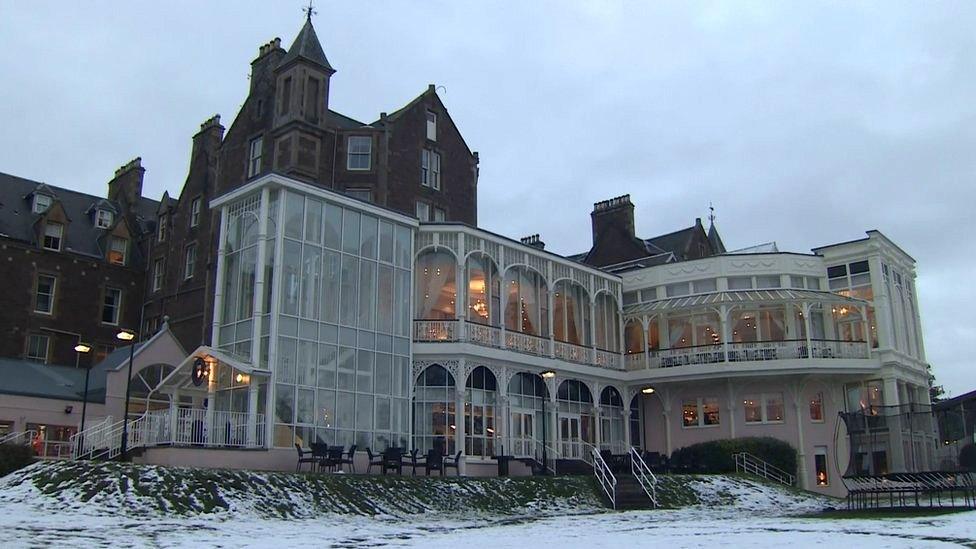Support grows for separate work permits after Brexit
- Published

Marta Swewczuk is a bar manager from Poland
Support is growing among businesses for a separate Scottish system for foreigners' work permits after Brexit.
It would apply after citizens of the other 27 EU states lose the automatic right to live and work in the UK.
Westminster is expected to publish its immigration plans as early as Wednesday, and it is likely to take a firm line on blocking new arrivals seeking lower-paid jobs.
The prospect of losing thousands of recruits from the rest of the European Union undermines the business models used by some employers - particularly in tourism.
Hotels in scenic but far-flung places can find it hard to recruit from small local communities, and find it hard to persuade British recruits to go to the end of the glen to live in temporary accommodation through winter.
'We're not getting that many CVs'
At Crieff Hydro, Marta Swewczuk is a bar manager from Poland. She doesn't know when she'll choose or have to go home, and she can see the point of view of those who want jobs for British people.
She said: "I understand this, because seen from back home in Poland, I wouldn't be happy if foreign people were taking our work places.
"But we are looking for a lot of staff members, and not many people are applying from the UK for these positions. So if not us, I don't know who would run the restaurants in this hotel."

Bence Banati is from Hungary and is the restaurant manager
Her boyfriend, Bence Banati, is from Hungary and is restaurant manager. They met while working in Braemar.
He said: "It used to be easier [to recruit] in hospitality.
"We're not getting that many CVs. We used to choose from more available people. There are not many new or young people coming any more."
While many rural hotels close, Crieff Hydro gets busier during the festive season. The company has nine hotels and 1,000 workers - 40% of them are EU nationals from outside the UK.
They have hundreds of people to serve each night, and three quarters of those serving through the evening are foreign. The company's owner and boss, Stephen Leckie, says the company would simply fail without them.
"One in five in this industry comes from Europe," he said. "In this company, 40% come from Europe. We need them working daytime, evening and weekends, and this week, for example, we'll feed 500 party revellers each night, and 75% [of serving staff] will come from Europe."
And what if they have to go home after Brexit?

Crieff Hydro is a popular location during the festive season
Mr Leckie replied: "We will fail. If you want a gin and tonic this evening, the chances are it will be served by a European.
"The kitchen staff will be from Europe: French and Spanish. On the kitchen stewarding side, they'll all be from Latvia, Lithuania, Slovenia and Poland.
"Without them, there would be nobody to clean up, because we can't persuade local folk, who already are in employment, to come and work the evenings and weekend for us.
"So the ask of government is: make it really easy for these young folk who want to come to Scotland and work - whether it's permits or visas or just making them feel welcome."
That is not looking likely. The Migration Advisory Committee (MAC), official adviser to the government on its immigration policy, chaired by Prof Alan Manning, recommended in a report published in September that such workers could be replaced by British workers.
"Although lower migration might lead to population decline, this problem is not something that starts at the Scottish border," it found. "Some northern English regions have similar prospects.

Stephen Leckie is the owner of Crieff Hydro
"Migration is much less effective at dealing with a rising old age dependency ratio than increases in the pension age.
"Overall, we were not of the view that Scotland's economic situation is sufficiently different from that of the rest of the UK to justify a very different migration policy."
The MAC did not take a view on whether there should be different visa systems around the UK, saying that would be a political decision. It faced similar calls from Scotland, Wales and Northern Ireland.
The report said: "We do not recommend an explicit work migration route for low-skilled workers with the possible exception of a seasonal agricultural workers schemes. This is likely to be strongly opposed by the affected sectors.
"If there is to be a route for low-skilled migrant workers we recommend using an expanded youth mobility scheme rather than employer-led sector-based routes.
"If a seasonal agriculture worker scheme was introduced, we recommend that employers pay a higher minimum wage in return for the privileged access to labour this scheme would give the sector, in order to encourage increases in productivity."
'More restrictive system'
Some of the larger employer groups have moved from scepticism about the extra red tape of having a different work permit in Scotland, which would not apply in other parts of the UK. That remains a concern.
CBI Scotland has raised the question of how to manage people whose work requires them to travel across the border from a Scottish base.
But that large and UK-wide employer organisation is one of those which now open to the possibility that Scotland could have a different way of handling foreign work permits after Brexit.
Tracy Black, director of CBI Scotland, said: "Get a good deal and Scottish businesses are best served by a single UK-wide system, provided it meets their needs.
"A more restrictive system and the case for greater flexibility for Scotland increases".
Marc Crothall, chief executive of the Scottish Tourism Alliance, says the sector now backs a Scottish visa scheme.
He said: "I know there is a proposal from the Scottish government to look at a visa specific to Scotland, to allow people to come and work in Scotland, under the threshold of the £30,000 salary band, and hopefully that would enable us to attract people and they would stay with us.
"The UK government and others need to factor in Scotland's unique situation. We have very fragile areas in our economy and attracting and retaining people into those areas is absolutely vital."
At the Federation of Small Businesses, recent survey evidence has pointed to a higher dependence on foreign recruits in Scotland, and particularly the Highlands and Islands.
Regional migration schemes
A spokesman said: "If whatever is put forward in the forthcoming immigration white paper does not address these issues, and does not give Scottish businesses the space they need to recruit the right people, then we have argued that there should be a system in Scotland which responds to the particular needs of Scottish industry and demography.
"We are aware of some of the practical objections to this model, but we believe they could be overcome. At least we should explore the options and test the arguments."
Matt Lancashire, director of policy and public affairs at Scottish Council Development and Industry (SCDI), said: "Scottish employers need to access international talent and a range of skills post-Brexit, to ensure a thriving sustainable economy with quality public services.
"SCDI supports greater flexibilities on immigration for Scotland to respond to its distinct demographic and employment needs, including re-introduction of a post work study visa and salary thresholds which are far more appropriate for average pay rates in Scotland.
"Other countries successfully operate regional migration schemes which target the specific needs of their economies and SCDI believes that there are workable options for more differentiation in the UK's system."
The outcome of the debate depends on the nature of Brexit. If there is no deal, the rights of EU workers are not clear, and may relate to how long they have spent in the UK.
The deal forged by Theresa May and backed by her cabinet would delay the point at which EU nationals would lose the right to work in the UK, but it is not clear what rights would be negotiated for new arrivals from the continent after the transition.